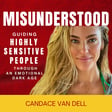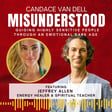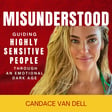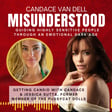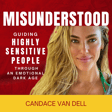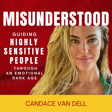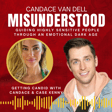Become a Creator today!Start creating today - Share your story with the world!
Start for free
00:00:00
00:00:01

Ep 12 Heal from Trauma Bonds: An Interview with Dr. Nae, "The Ex-Wife of the Wolf of Wall Street"
I chat with the incredible Dr. Nadine Macaluso - aka "Doctor Nae" - who was the real-life inspiration behind Naomi Belfort from "The Wolf of Wall Street". We dive deep into her journey of overcoming an abusive marriage, pursuing higher education, and becoming a leading specialist in somatic psychotherapy.
Dr. Nae shares fascinating insights on trauma bonds, the importance of resilience, and practical advice on maintaining financial independence. Trust me, you don't want to miss this. Tune in for a mind-opening discussion about healing, empowerment, and self-worth. 💪
Watch the full episode now, and don’t forget to share it with anyone who might need to hear these powerful messages! 🌟
Transcript
Introduction to 'Misunderstood' Podcast
00:00:02
Speaker
Hello, beautiful souls. I'm so grateful that you're tuning in. Welcome to my podcast, Misunderstood, guiding highly sensitive people through an emotional dark age.
Sensitivity as a Gift
00:00:11
Speaker
I'm your host, Candice Van Dal, and I'm honored to embark on this transformative journey with you.
00:00:17
Speaker
Have you ever felt like you didn't quite fit into the world around you or even your own family? Like your sensitivity was a burden rather than a gift. If so, you're not alone. And here's the truth. Your sensitivity is not a flaw. It's a superpower. It's what allows you to feel deeply, to connect with others on a profound level, and to access a higher realm of consciousness.
Purposeful Living and Emotional Honesty
00:00:38
Speaker
And on this podcast, we're going to explore how to harness that power and use it to create a life of purpose, passion, and true confidence. Here in this sacred space, we honor your sensitivity as the gift it truly is. Get ready to embark on the journey of unapologetic emotional honesty and next level healing. Let's dive in together.
Meet Dr. Nadine Macaluso
00:00:59
Speaker
Hello, everybody. Today, my special guest is Dr. Nadine Macaluso. She's known to her patients as Dr. Nay, and she is the real life inspiration behind Naomi Belfort's character in The Wolf of Wall Street. If you haven't seen that movie, you got to go check it out. She survived a turbulent eight year marriage to Jordan Belfort marked by abuse, greed, and trauma. Following her experiences, Dr. Macaluso relocated to California. Her journey of trauma and healing inspired her to to return to school at age 39.
00:01:29
Speaker
where she earned her master's in counseling and a PhD in somatic psychotherapy.
Healing Trauma Through Education and Experience
00:01:34
Speaker
She further specialized with a two-year postdoctoral training and neuro-effective relational model, NARM. As a therapist, Dr. Macaluso combines her education and personal experience to help others heal from trauma. Her practice focuses on assisting patients and connecting with their true authentic selves, fostering confidence, resilience, and agency.
Recognizing Trauma Bonds
00:01:55
Speaker
Dr. Macaluso firmly believes in the potential for post-traumatic growth, instilling hope in her patients and guiding them to reach their potential in life and love. Please help me welcome my special guest, Dr. Nadine. So, welcome Dr. Nay. I'm so happy to have you on my show. Oh, thank you for having me.
00:02:15
Speaker
What a pleasure. i I did your introduction and I thought a good place to start would be a lot of people know what trauma bonds are. A lot of people don't know if they're in it. So I wonder if you could give us um yeah some examples of how to know or detect early on if this could be a trauma bond and what to do. Yeah. So I mean, the the most obvious thing is trust your intuition, right?
00:02:42
Speaker
Because hormones can manifest in so many different ways. But the most obvious ones are if you know you see somebody seriously love bombing you, like if they're saying they love you after two weeks, that's probably not possible. And why are they saying that to you if you see any substance abuse very early on? And if your gut says something doesn't feel right here, even though it's looking right,
00:03:12
Speaker
And so but those are just some very simple things. And also, I find with these guys, or women, because we know it can be women too, but it's mostly men, is that they're not going to be curious about you. You'll notice that they don't ask a lot of questions about you initially, right? They're very they're much more interested in themselves. And if they do ask you a question, it's usually just to mind map you.
00:03:38
Speaker
you parrot you, right? Total of the mirroring. Yeah. This is something I deal with a lot with my clients where they, and I'm sure you've heard this every day where people think, Oh, it's my soulmate. They're just like me. They have all the same interests. I'm like, no, they've been studying you. Yeah. like you It's like, it's like that twinning thing. You know, I love tennis. You love tennis. I love sushi. I love sushi. You know, I love romantic comedies or whatever it is because that just doesn't usually happen. And actually a lot of times opposites attract.
00:04:08
Speaker
so But it's so subtle for everyone and that's why I have
Manipulation and Vulnerability in Trauma Bonds
00:04:13
Speaker
that. We usually also have to remember the mass doesn't start to fall for like three to four months. So they're so good at hiding it in the beginning. That's why I have that pathological lover checklist.
00:04:26
Speaker
Yeah, just so you guys know, this is the book. She's got it right there. You have to check this out. I got it maybe like three, four days ago and I could not put it down because you hit so many different specific points that people don't even know are points to look into. So when we talk about this stuff, it's interesting because it can be so covert as well and women fall into this. But you know, I've always i told my clients and seen in my own life that there has to be some type of vulnerability there.
00:04:57
Speaker
for them to target you. Would you agree with that? Yeah, you know, I think honestly, I think they target anyone and everyone. I just really do because I've worked with famous actresses, to school teachers, to lawyers, to judges, to housewives, to moms. I think that they're so good at it, they can actually target anybody. And I think what the only thing we have to be is a relatively normal trusting person.
00:05:25
Speaker
I love that you said that because you know how many people blame themselves for not figuring it out or not understanding or not getting it. What's wrong with me that I fall into this and then people don't realize that intermittent, you know, reinforcement where it becomes this drug. They say it's worse than a heroin addiction to get over this.
00:05:44
Speaker
feeling, but it's like this intermittent thing where it's so amazing at first and then it becomes not so good and you're like, what did I do wrong to make them shift? How can you help women through not self-blaming but educating? Yeah, well, I think, you know, here's the thing. If somebody's words aren't matching their actions or, you know, it if let's let let me just give you an example. You know, let's say you have a great time with your lover and he goes off to do something.
00:06:12
Speaker
And then all of a sudden, he just comes home with a different energy and starts nitpicking you. Why are you washing the dishes like that? Why are there droplets on the floor? ah you know I didn't want that for dinner. right And what happens, or they say, um you're always this. You're always drunk. When somebody starts to nitpick you, they're looking to blame you, because remember, they're always the victim. And when you have self-doubt, you're easier to control.
Psychological Conflict and Support Networks
00:06:42
Speaker
hundred percent And that comes with a lot of like empathic, sensitive people who are like, oh, they're so conscientious. And I know you have a list of those character traits as well. Yes, yes, yes. And they're so self-reflective, right? So self-reflection is beautiful in most cases, yeah but not when it can get weaponized against you. And that's really what they're doing. They're weaponizing your self-reflective capacity. yeah Oh, I'm willing to take accountability. It must be me. Because if it's must be me, then I can change. Right. and I can change the relationship. Total over responsibility. And I think that's so interesting because what we also forget to look at is this is one sided conscientiousness. Like they aren't saying, Oh, you're right, honey. I was being critical. That's never the case. that No, it's never, it's never the case because they don't take accountability and they can't really hear you.
00:07:37
Speaker
And I always say if somebody can't hear you, they can't love you. So they just, they can't do it. You get something interesting and that it's like a drug. And I was doing a session this morning and you know the discard is so real. And I've had sound uses this week with discard. And she said, this discard was more painful than when I went through breast cancer. Chills.
00:08:01
Speaker
Yes. Yes. I had a new client this morning in my membership program and he came in full withdrawal and he was saying, and I linked it back to his mother because a lot of times people don't realize it and this isn't always, but sometimes a lot of the time it can start with an original wound that people are unconscious of. And so I initially saw it as a mother wound and he told me, yeah, my mom abandoned me 20 years ago.
00:08:27
Speaker
and so I saw this this inner child longing, but this adult understanding that this is wrong, so it becomes that cognizant dissonance that you talk about. Can we go into that? Because it can come up in so many different ways. Yeah, cognizant dissonance is simply the mental discomfort or confusion you feel when two things are conflicting inside, right? Wait, I thought, wait, is he bad or is he good?
00:08:53
Speaker
Am I crazy or is he crazy? Is the relationship good or bad? And so because this person has two masks, which I like now to call Dirty John and Romeo. Love it. Right? Because of perfect descriptions. And so it's literally like you're having two experiences with two different people. Yes. So you're totally, totally, totally confused. And that split can happen many ways too, right? When your own inner child is conflicting with your conscious adult.
00:09:21
Speaker
that can happen inside of this. So you have so many different layers about you, about him, about the relationship right that are going on in your brain. And the cognitive dissonance is the glue. Yes.
00:09:34
Speaker
Yes, it keeps you there because the gaslighting, the level of gaslighting in these relationships is far none. It's insane where you can say, I'm seeing that you're saying this, but I'm also not experiencing that example. And they can say to you, well, you're just delusional or you're perceiving it wrong. And those people that have self-doubt are like, you're right, it must be me. Because we grow up thinking,
00:09:58
Speaker
If I can understand you, I can, you know, fix things. And if I can help you understand, you know, and we have this almost savior rescuing complex that comes over us where we're like, I just need you to validate. And their whole tool, the gas lighting is to completely invalidate. So going to them as your savior. So it's like the one that's abusing you Stockholm syndrome, you go to for comfort. Right. But see, it's a little different than Stockholm syndrome in the sense in Stockholm syndrome, you don't know your abuser.
00:10:28
Speaker
this is worse real because you you know it and you know your abuser right listen if somebody kidnaps me and there's a total jerk okay and abuses me that's different but I don't expect the psychopath to be sleeping next to me in bed hundred percent And you talk about in your your book how a lot of women have to go to the abuser because they haven't told anyone what's going on because it's embarrassing. But also, if this person is covert, they're very good at making you look like the crazy one and making you think that no one's going to believe you. So if someone has this situation happening, which I see a lot in my work, and they don't feel they have support, what would you suggest they do to start to unravel some of this?
00:11:11
Speaker
Well, here's the thing is we can't build resilience in isolation. We cannot solve this problem on our own. You cannot just go on the internet and search narcissism and think you're going to get help. You would have to reach out to a helper such as yourself, myself, right? Even, you know what, this is what I say. A lot of people say therapy and coaching, right, is so expensive. But to get my license, I have to do 3,000 hours for five bucks an hour. Find an intern.
00:11:40
Speaker
They're like, Mr. Rogers, you know, you're too young for that. But Mr. Rogers always said, okay, the helpers, you have to reach out and you have to fight past the shame. You must fight and then when you approach what you fear on the other side is healing. And you'd be shocked that somebody will be there to listen and give you that balance. Like you're not crazy.
00:12:07
Speaker
Yeah. Yeah, absolutely. And I think people start to, I love that you mentioned this too, because people are like, well, I can't afford it. I'm like, no, no, no, you can. There are places. Yeah, you absolutely can. Don't use that as an excuse. Some people do that too, to stay in it longer because they're so afraid that there'll be nobody else there or maybe I'm wrong about this. And so one of the things I want to ask you is people go down this spiral when they're in withdrawal because they have no idea what withdrawal is.
Coping Strategies and Building Resilience
00:12:33
Speaker
And when they're in it, they don't think they'll ever get out of it. So they might as well just go back. Yeah. What would you say about yeah what would you say about withdrawal? Yeah. I mean, listen, it's like anything, any top emotion, you have to stay in it and tolerate it. And we long for the love bombing side. We long when it was good. And so yeah, withdrawal and pain and suffering and it is hard, but Again, on the other side of that, if you can stay in it, soothe yourself with adaptive coping mechanisms, right? Have a good support scene, really resource yourself. You will get through it. I mean, I remember like literally, like I remember once falling to my knees, literally on the concrete collapsing and that's okay, right? Give yourself the space to feel all these intense feelings. You're not gonna pass from them. Like I know it feels like you will like not
00:13:32
Speaker
last on the earth, but you humans are resilient. You're going to make it. You're going to make it. And it's okay if you stay in bed for two days and then say, okay, I call it my Mad Lucia moments, right? Just give myself a place to be, feel how I feel. And then but you we, as as humans, we have to learn to tolerate, tolerate these tough emotions.
00:13:57
Speaker
I could not say more about that. I remember this is two decades ago when I went through my gnarly, gnarly trauma bond and like you, I remember laying on the bed thinking I'm not going to, I'm going to die because I'm going to lose my breath and my heart's going to stop and I would rather die than feel this pain.
00:14:15
Speaker
And I want to encourage people to go through that pain too. Not alone. You do need support like you said, yeah but if you don't go through it, it will get far worse. And what I don't like to see is people saying, I can't deal. I can't deal. And then their relationship goes to the point where they have to leave and you don't want that where you literally have to leave because your life is going to be, you know, at risk. So instead it's like, wouldn't you,
00:14:41
Speaker
Trust us that you need to feel the depth of this gnarly emotion because it will go away when you feel it. It will. Yes. And just like a yeah withdrawal, right? I mean, that's what we have to do. They have to tolerate. They don't go back and do the drawing again. Then you're back in the whole cycle all over. But I understand you when you're in it, but you and I pulled people to the other side and we've gone to the other side. So I always say to my patients, like, I have hope for you. I have faith for you.
00:15:10
Speaker
You don't have to have it right now. I'll carry that for you. Yeah. Um, this new guy today was telling me, you know, the woman who was abusing him is abusing him. It's her birthday on Monday. And he's like, if I don't reach out, I feel stressed. I'm like, if you do, you started all over again. Because what people don't realize is it's kind of like weaning off of sugar or anything is you start to do good and you're like, Oh, a little bit's fine. And what I like to explain this is, is like, if you are sober from alcohol and you go to dinner at a bar with a bunch of people drinking,
00:15:43
Speaker
you're going to start to feel triggered. yeah You're going to start to feel it. And so the whole point went with no contact is not only physical, no contact, but mentally starting to have these rules for yourself and this discipline of stop thinking about them. It's the hardest thing in the world to do. But when we're stalking them at Instagram and we're thinking about them or wondering what they're doing, you're staying in an emotional trauma bond. Yeah. Yeah. Well, I would say he doesn't live in your house anymore. Don't let him live in your head. Right.
00:16:13
Speaker
But rumination, whether you've been in a trauma bond or not, is the number one reason people come to therapy. And so that's where you have to really use thought stopping and use your mind to control your brain and say, okay, is this thought about this person useful or helpful? Nope. Okay. Let me go to the house. Let me take a shower. Let me wash my hands. Let me listen to music. Let me watch dumb TV. Let me distract. People don't understand that.
00:16:42
Speaker
Distracting your mind from useless thoughts is okay. It's wonderful. Yes, you don't need it, but it is rumination. It's really hard to bite.
00:16:54
Speaker
I think so many people would say it's impossible. And that's why I love how you're talking about what to do instead. And one of the things that I was going to say, you mentioned this earlier, when I was going through my divorce, I think it's been four years now. I remember for like a year and then some months after, I would let myself, and I'm still seeing clients constantly because the work actually helps when you're going through hard things. but i went Oh, it's literally the best, but I would sit there and I tell everyone this. I would sit on the couch after work and for like two hours, I would stare at the ceiling and say, I get to do nothing and that's fine. I get to sit here and feel whatever I need to feel because I'm going through hell. And when you do hard things and you get through it, you realize how capable you are to do hard things. And then you understand how to not get into that again. And if you did, you'll be fine. So all of that shifts. And one of the things I wanted to ask you,
Symptoms and Healing from Trauma Bonds
00:17:46
Speaker
Um, cause you say this in your book and I think it's really important to talk about is the symptoms afterwards, like what someone goes through emotionally and psychologically after they've gotten out of a trauma bomb, because people say, Oh, I'm just broken for life or there's something wrong with me or he changed me or should change me. And I say, Oh, that's temporary. But can you talk about some of the symptoms that come up after abuse like this? Yeah. So, so you've been through trauma, you've been through relational trauma, right? So you're going to get trauma symptoms and you're going to get a symptoms called complex post-traumatic stress disorder because that's caused by chronic relational trauma. And so you're going to get, you could get intrusive symptoms like flashbacks, right? Or rumination, or you could get, um, depression, shame, hopelessness, anxiety, extreme startle reflex. You can get physical symptoms. You can get, oh God, avoidance avoidance is the number one response to trauma.
00:18:44
Speaker
So there's all and symptoms that you can get, but here's the thing. You don't get all of them usually, right? There are a few that are your specialty. And then once you know what you have, and I have an assessment on my website for CPTSD, you can't treat what you don't know what you have, but we know that all of it is treatable. Relational trauma is not a life sentence, right? We can treat it.
00:19:09
Speaker
And so, but yeah, the symptoms are real. But we used to say, oh, she's borderline, or she has bipolar, or she's having a mental breakdown. It's like, no, you have CPTSD. Oh my God. I love that you said that because so many people feel that when they've had, say, narcissistic abuse, they feel like they become the narcissist. and So many. Have you heard that? Yeah. You know, but here's the thing, just the fact that you think you are one, probably not. Because when I was in school and we learned about the DSM,
00:19:37
Speaker
And I thought I had every diagnosis of my teachers. When you think you have it, you don't. Yeah. you died Because they they've always been shaming and blaming you for everything. yeah You don't explain the victim.
00:19:52
Speaker
Especially, I don't want to say especially, but I'll say there's a strong, there's a strong pull to people. A lot of my clients are, um, People who have had childhood trauma and had a narcissistic parent, which by the way, we can absolutely have a trauma bond with a parent and so they grow up. I'm one of those. You grow up thinking, there's definitely just something wrong with me and you you absolutely cater to the fact that you can't get out of it because you're pretty sure.
00:20:22
Speaker
And if you've been in a relationship with someone for a long period of time, you're also brainwashed from the person you put on the pedestal to think it's you. And so I love that you offer. It's CPTSD. A lot of people think, no, I just have a different personality disorder, and that's why we got together. No, you're actually a wonderful, empathic, kind human who sees through a lot of things, and that's why. And you have symptoms that will go away over time. They will. They will. And when you grow up you know with a dysfunctional in a dysfunctional household, and you do have CPTSD,
00:20:52
Speaker
going into this relationship, right? You have to remember that child always has shame and self-blame too, to stay attached to the parent. Because you have to, because you can't make it, right? So then that shame, shame and self-blame shows up in this relationship. And so I always say to my patients, when you're in shame and self-blame, you know, you're in your pattern. You know, it's not real. I love that. That's different. Oh my God. ability I love that you said that it's like it's your programming it's not your truth and a lot of people have an issue with like is this my trauma or my truth and one thing i was gonna say to you because you just kinda hit on this is. When we have let's say an abusive parent but same thing with a partner.
00:21:35
Speaker
is you almost have to adopt their way of seeing you to stay connected to them. So if they're shaming you all the time, you have to self shame to stay connected. And so a lot of times so people don't want to disconnect, which means they're not going to see that they're not a hundred percent the problem. that's And that's what keeps us in these trauma bonds is thinking, Oh, maybe it is me. Maybe I can do better. We got to stop that altogether.
00:21:57
Speaker
Right. We've got to, it's not you. I always used to say that on my set upside down and call myself by my toenails and vomited green vomit. I thought Jordan would change. Right. That wasn't happening. It wasn't me. I didn't even try that. Not that powerful.
00:22:18
Speaker
Thank God. Thank God. Thank God. But yeah, but you know what? That's another really good point because a lot of people are so afraid that when they leave this abuser, they're going to change and have love with someone else and be totally different. You've heard this. I had a dollar for every time I heard this. It's hard to be retired. Yes. Nothing could be further from the truth. They don't get a lobotomy. They don't get a heart attack.
00:22:46
Speaker
And nothing could be farther from the truth. They're going to do the same thing to the next victim. Right. And the thing that we forget ah when we're through it is, oh, it does look so good, though. I'm like, so did your relationship. Your relationship with them looked great, too, because you kept it a secret, too. And at home, guess what? It sucked. And so does her relationship, you know? And they're like, oh, that's, yeah. Yeah. Yeah. And that has to do with the worthiness.
00:23:12
Speaker
The unworthiness wound is, will that personal get them better? They'll be better. I'm like, no, no, no, no, no. The reality is you were phenomenal. You were a rock star in that relationship and you just stayed too long because you forgot your worth during that relationship. And now that you have it back, you have to remember the beginning. Now you can see those red flags that you ignored, which by the way, I should ask you, why do we ignore those red flags?
Understanding Red Flags and Relationship Myths
00:23:38
Speaker
Well, we ignore the red flags because usually these guys like data set warp speed. So they're dating us so fast and giving us so much love, vomiting, adoration, adoration in gifts and attention and affection that all of those good right dopamine and oxytocin things are just floating around our body. And because we don't want to see the red flags. We don't want to believe that people are evil. We don't want to believe that this person that we're think we're falling in love with is is pathological. And so I just think it's human nature to ignore the red flags. And I was young and nobody was talking about it back then. So I was really screwed. But yeah, they want to believe that people are good. Yes, absolutely. All the work we do, I don't want to run around thinking people are bad. But now we have to know the red flags because we ourselves a lot of time, a lot of years and a lot of unnecessary trauma.
00:24:35
Speaker
Yes, and I always say there's two types of people. It's not good people and bad people. It's healed people and unhealed people. but And the most important thing about this is people will come to me and say, but I'll never find that level of love again. And I say, that's a good thing because that level of love isn't real. That level of love is love bombing to do the opposite. Normal love feels very, or I said should say healthy love, feels very boring to people who've come out of this because your nervous system is still dysregulated.
00:25:03
Speaker
so Have you come across a lot of clients who are like, well, what do I do? like Is this love or is it not? It feels so different than that. Yeah. Even my own daughter, she's happily married now and she's a therapist, but she was like, is everything right with us? We're just so calm even and I was like, yeah, it is. that's norm That's good. That's okay. But again, with the myth of romantic love and all these rom-coms, I grew up with like pretty woman and Wall Street and I can't even remember, officer, a gentleman, right? And so all these movies were depicting love in this very aggressive, pathological way. And that doesn't mean we'll don't get butterflies in the beginning and it doesn't feel, you know, yummy, but it just doesn't have to be this fast, furious, warp speed, your mind, that's it. we We're, you know, we're going off into the sunset. That's just not right.
00:26:00
Speaker
I think the word would be consistent, a healthy relationship. I'll be honest. I'm totally guilty of going from a trauma bond into a healthy situation where I'm like, I don't know. Like this isn't intense enough. This is boring. You're boring. You're not enough. I've totally done it. yeah And then over time, I'm like, wait a minute. My nervous system feels good. Even when we fight, wait a minute. I never feel like I'm going to be left. I'm not someone's possession. Oh shit. This might feel really like good.
00:26:30
Speaker
And those are the ones that last, but we screw it up when we're still on heels. We're like, you're not intense enough or like, you're not giving me enough. No, it's true. It's very, very, very common. um Yeah, but boring is good.
00:26:44
Speaker
Boring is good because boring, by the way, won't ever be insane. It won't ever be abusive and it won't ever be something you have to question. I know women a lot. He happens to men too, but women a lot will say, I just don't know how he feels. I don't know why he's ghosting me. Like ghosting and ignoring is something that my healthy relationship would never do because even if we're in a fight or something's going on, we're talking about the fight.
00:27:10
Speaker
We're not abusing and scaring and having these tactics to make you all nervous inside. That's control. And a lot of women think control is love. And it truly isn't. Yeah. did I mean, you know, and that's, ah that's at the core of the trauma bond is the person wants power and control over you. That's why they're also manipulating gaslighting, love bombing. They're using all these tactics, right?
Autonomy and Healthy Relationships
00:27:33
Speaker
To have power and control over you. And that's, and It's not controlled because the way I describe love is quality of connection. I'm giving someone the space to be who they are, to give someone their own autonomy. ah auto You don't get that in a trauma bond.
00:27:51
Speaker
You don't get autonomy. And a lot of people who have come from childhood wounding, who have abandonment wounds, but who've also not been allowed to be who they truly are, their authentic self, they get scared in healthy relationships that want them to be their authentic self, autonomous self, independent self, because that control makes them feel like, Oh, I don't have to worry about making decisions because I don't trust myself. And that's what I see happens a lot. People that are more dependent, like I write about women.
00:28:19
Speaker
have more of that dependency issue, right? Yeah, it's initially feel safe, right? In conditionally. Oh, he's this person is taking care of it all. But there's a there's no Prince going to take care of it all.
00:28:34
Speaker
No, you have to be the Prince. And what happens with that Prince is then he's putting you in a cage and he controls everything. And that starts to feel really scary. And over time, you don't know how to get out because one of the things I like to tell women is, you know, financial autonomy is huge so that no one has that power over you and even more emotional autonomy so that you can't get swayed because of this power dynamic. And so,
00:29:00
Speaker
How would you encourage women who say I have three kids. I can't make my own money What can they do to start to feel more financially in control of their lives? Yeah, one that's a hard one. In fact um I'm working on that right now with like an outside resource We're actually trying to put together a whole set of resources that women can go to for recruiters for websites people to connect to to people that can help them and Because it is really really challenging and what I say is that always have your own bank account always have your own credit card Understand even you're married Understand your finances know what your mortgage is know what the taxes are that is also your responsibility as an adult to End your own financial situation, right? No more
00:29:53
Speaker
No more of this, you know, oh, I didn't know I'm married. I was that girl, so there's no judgment. yeah yeah and That's why I want to educate people and just say no. Yes. Where's this money going? How many bank accounts do we have? What are all the passwords? You have to know these things as an adult.
00:30:13
Speaker
just Honestly, it's embarrassing to say that was totally me too because when I got married, I was like, well, look at our great life. I'm sure everything's fine. and That was the disruptive piece. Everything's taken care of. I don't need to know. I don't need to ask because everything's just perfect. And then it became very unperfect. And I was like, oh, I don't even want to know. And then I started denying, looking away. And then when I couldn't deny and look away anymore, I was like, hmm, I've got to figure
Facing Fears and Achieving Balance
00:30:37
Speaker
this out. And what's so interesting is Things can appear one way so that you don't ask questions. Ask them anyway. Ask the questions. We deserve to know everything that's going into our lives. Yeah. Or not. I think it's a really good point about, you called it tonight, but I call it avoidance. You know, we avoid what we don't want to know. We avoid what we fear. And I know avoidance temporarily feels okay, but we have to build confidence. We have to have the courage to face what we fear. Yeah.
00:31:10
Speaker
approach. And I work with women with that all the time. By the way, I've worked with myself with it for 25 years. I'm finally there. Okay. So this is a life process, but approach what you figure approach what you want to avoid because what you want to avoid, that's where your goal is.
00:31:29
Speaker
I love this because what it keeps relating back to to me is people with inner child wounds who want to be taken care of. That feels like love. who want the money to be supplied to them that feels like love, who don't want to take responsibility. Can we talk a little bit about what a healthy, let's say, marriage dynamic looks like with power structures and really just a balance? What does that look like to people that don't know? Well, so actually, tomorrow's my 23rd wedding anniversary, so I think I could speak. And grad! Love that. Yeah, yeah. So in the patriarchy, we're taught about hierarchy, right? There's always got to be one up and one down.
00:32:05
Speaker
but So when we say we want to get rid of patriarchy, it's not that we want matriarchy and want the woman to be up and down, we just want everybody to be equals. Right? That's it. We want everybody to be equals. And, yeah and that's, you know, you have to, have you know, I watched my daughter again, I'll bring her up and her husband and like, they share in all of the responsibilities. Now there' some of them are, she's better at other things, he's better at other things, right?
00:32:32
Speaker
but there is an equal partnership where they both show up. My husband too, now that I work more, he does all the dishes and the cooking, right? yeah It's okay. He doesn't feel less. I don't make him feel less. You know, we're financial partners together. And the number one thing is when we talk to each other, we can hear each other. We listen, we've made changes for each other and for dominance in the beginning, right? And, and now we've switched.
00:33:02
Speaker
Like he was more in his mask than I was more in my feminine and now I'm more in my masculine and he's more in his feminine. And that in that way is going to help you become more whole. So that is so beautiful. Yeah. That is so beautiful and important that it can change because with a narcissistic partner, they are always dominant. They will always be in their severe masculine. Yes. Yes. Yes. Because they're dominating, threatening, intimidating to control, right?
00:33:28
Speaker
Yeah, no, so he's like, okay, whatever you need, I'm your assistant, I'll ship your books. It's really cute. Yeah, it's really cute. And i don't said I'm mom like, ship that damn book. Yeah. Yeah. I mean, I really appreciate it. Yeah. Lunch, you know, and that's, but it wasn't like that in the beginning. Yeah. so Right. So to be healthy, we have to be open, it's adaptive and flexible. um and and Both i just need to embody that.
00:33:57
Speaker
I'll be it imperfectly. Yeah, absolutely. And that's the thing, too, is perfect love, that
Critique of Cultural Myths Around Love
00:34:03
Speaker
fantasy love. Please know that it's only in the fairy tale. Please know that, you know, my favorite movie was Cinderella. My second favorite movie was Pretty Woman. Until I woke up. So when you said Pretty Woman, I'm like, oh, yeah, that's what I wanted my wedding to be. But that just goes to show you how culture brainwashes us so much. Yeah. Right? Because maybe if Cinderella Well, and and it ends at midnight once she marries them. Well, it ends once she marries them. So we never know what happens anyway. But once what would happen, you know, and thank God we're having different cultural messages for these women because it's also what we're fed.
00:34:41
Speaker
It is. It is. It's like this, this guy is going to come on a white horse and rescue you from everything. And you're going to become a princess. I believed it. You believed it. I and i wore princess straps at my first wedding.
00:34:55
Speaker
So did I. I was like, look, I look like Cinderella. Everything's exactly the same. Yeah, it was exactly the same. because It was a fantasy. It wasn't a reality. And that's the truth. Exactly. That's the truth. So, okay. I could literally talk to you for 12 hours. Like you're so easy to talk to and you're so cool. I'm wondering if there's anything you feel like we've missed that's really important and anything you want to share that we haven't covered. I think we've covered pretty much a lot of it.
00:35:25
Speaker
I just want to say that abuse is never the fault of the victim. Abuse, I learned that from Lindsay Bancroft's book, you know, Why Does He Do That? He keeps repeating that over and over again. And it's always the fault of the abuser. And to really, really take that in. It's not your fault if someone's abusing you, lying to you, betraying you, manipulating you, right? It's just not.
00:35:53
Speaker
and they try to make it like that and they make themselves the victim, but just know it's never correct. And it's not because of you. Now that doesn't mean you should stay, but just know I just want people to really get that because that's why I wrote my book because I really wanted to take away the stigma from the victim. And I hope you get that when you read it, right? I'm like really destigmatizing the victim in the trauma bond. Yeah.
00:36:19
Speaker
You do and I think that's huge. ah It is never
Closing Remarks and Resources
00:36:22
Speaker
your fault. You didn't do anything wrong and you need to leave. And so. And it is your responsibility to heal though. ah Exactly. It didn't happen to you because of you, but it is your responsibility to heal and you can heal. And even if it feels like you absolutely can't breathe, one day you will be past this and it will be no longer your reality. And so once again, I just want to remind you guys to go get her book. It is literally amazing. Run like hell. And that's the perfect title because that is the truth. And a the canadian where can we find you? How can they connect with you?
00:36:53
Speaker
Yeah. So you can, um, the real doctor needs you on Instagram, drnay.com. N a E F so many free resources, so many assessments, take a trauma bonds assessment, pathological lover assessment of C P T S D assessment. Tick tock the wild west of this social media. Dr. N a N a E L M F T. And, um, that's really it. Yeah. man Yeah. And also,
00:37:21
Speaker
What I'm doing, because next month is Domestic Violence Awareness Month, I'll send you a link for this, where if people click on it, they get the first chapter of my book for free. Oh, I love that. That's so nice. You guys want me to put it in that. It's crazy for Domestic Violence Awareness Month.
00:37:39
Speaker
Yeah, I love this. Thank you for letting us know that. Thank you so much for joining me. This has been such a pleasure for me and so insightful. Really fun. And maybe we'll do it again one day soon. That would be fun. i would yeah Awesome. Well, thank you so much. You're amazing. Go check her out, you guys, and share this with anyone that you think needs to hear it. And thank you so much.

